The role of student partnership in creating a sense of belonging: the case of the Undergraduate Education Research Conference
Authors: Karen Healey, Xinyue Zhang, Lingyi Zhou, Chang Gao, choen Yin Chan, Kate Sapin and Sara Jackson
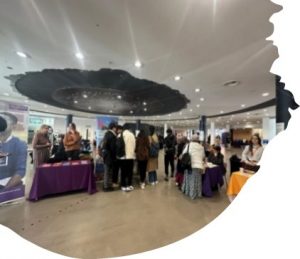 Policy construction of students in higher education as instrumental consumers has led to increasing demands for student participation in the formulation of metrics as the consumer citizen (Mendes and Hamnett, 2020). Together, as staff and students at the Manchester Institute of Education (MIE), we wanted to go beyond this consumer partnership to create one where, as ’active citizens’ in partnership (Arnstein, 2019), we could imagine, organise and deliver our Undergraduate (UG) Education Research Conference.
Policy construction of students in higher education as instrumental consumers has led to increasing demands for student participation in the formulation of metrics as the consumer citizen (Mendes and Hamnett, 2020). Together, as staff and students at the Manchester Institute of Education (MIE), we wanted to go beyond this consumer partnership to create one where, as ’active citizens’ in partnership (Arnstein, 2019), we could imagine, organise and deliver our Undergraduate (UG) Education Research Conference.
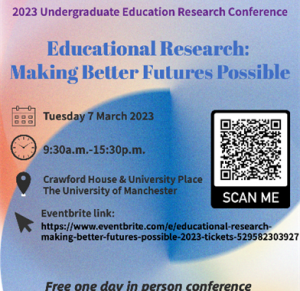
In seeking student volunteers to co-construct the conference, we wanted to understand what participation in that student partnership would involve. What we hadn’t considered at the start of our journey was how this evolving partnership would generate a sense of belonging for all those involved in this collective endeavour.
A Partnership framework.
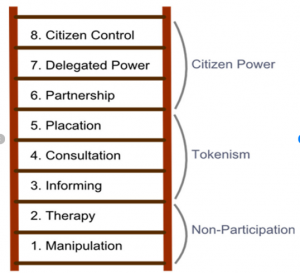
Partnership became our way of working throughout the planning, delivery, evaluation and dissemination of learning from our experiences. In trying to understand this participation, Arnstein (1969, 2019) ‘Ladder for Citizenship Participation” recognizes the sharing of some power in partnership at Rung Six of her ladder. With the redistribution of power through negotiation between citizens (students) and powerholders (staff), planning and decision-making responsibilities are shared. For Arnstein, partnership can be extended at rung seven with Delegated Power by giving up at least some degree of control, management, decision-making authority. It was with this conceptualization of partnership, of redistributed power and delegation that enabled our autonomy in a collective endeavour, to imagine, organise and deliver our conference.
The conference planning team:
Our initial core planning team comprised of staff members from the BSc Education programme, student volunteers from the BSc programme and post graduate research students. The undergraduate student volunteers were recruited via a Microsoft form activity in class whereas the PGRs were recruited via existing relationships.
The space we sought as we planned our conference recognized that expertise sat in each of us by interconnecting that we could grow together (Massey 1994) . Perhaps the words of one of our student volunteers best describes our way of working as:
‘a network that sought to understand and value each other’s contribution, recognising that our differences were our strength as a partnership’
The use of digital spaces to meet, such as Zoom, WhatsApp to connect, and Padlet to share information and plan schedules were important in the redistribution of power and developing our partnership. The freedom to access, use and contribute also acknowledged the reciprocal nature of our partnership, further shifting the planning team to climb the rungs of Arnstein’s ladder (Arnstein, 2019)
What we did
With an established conference date together, we created our project plan. A commitment to choice and autonomy were important for decision making as we worked individually or in small teams based on interest and expertise.
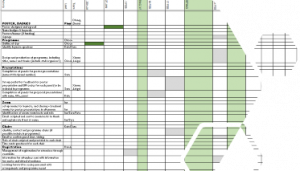 Where university structural arrangements created barriers, such as ordering catering, it was accepted a staff member would lead. However, where this was not the case, volunteers led, such as the social media strategy, decisions on poster competition rules and student volunteer roles for the day of the conference.
Where university structural arrangements created barriers, such as ordering catering, it was accepted a staff member would lead. However, where this was not the case, volunteers led, such as the social media strategy, decisions on poster competition rules and student volunteer roles for the day of the conference.
The planning group student volunteers worked as a team to recruit and mentor other UG students for roles on the day of the conference to secure the successful delivery. Our meetings as student volunteers were about collectivity, flexibility and autonomy of choice (see Fig.1).
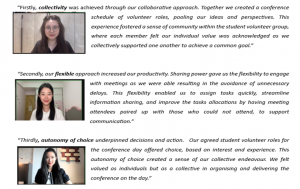
Figure 1: Collectivity, Flexibility, Autonomy: three of our volunteers reflect on the student volunteer team approach
Reflecting on our partnership.
We recognised roles of planners, deliverers, supporters, evaluators; and disseminators as an outcome; from within and beyond the partnership, with the recruitment of others by our volunteers with the dissemination of both information and experiences, such as this blog and our ITL conference paper presentation! Student volunteers have since co-founded the new BSc Education society.
(https://instagram.com/uom_step4ed?igshid=MzRlODBiNWFlZA==)
The sense of belonging that we have felt resonates with a “subjective feeling of deep connection with social groups, physical spaces, both as individual and collective experiences” (Allen et al, 2021: 71). This is best described by one of our volunteers as ’something larger than this conference’.
The main take-aways from conference feedback:
- The UG research conference is part of a bigger programme experience where participants engage with education research and MIE as a whole.
- Student partnerships are based on trust, autonomy, choice and collective planning.
- A sense of belonging evolves – not just a task-finish activity.
- The planning group’s participation and enthusiasm diffused – drawing others into this collective endeavour
- Our partnership has adapted, creating learning spaces.
So… our call is for student partnership opportunities to be built coherently into the curriculum experience through pedagogical approaches and assessment opportunities. This conference is one ‘large’ space supporting our collective endeavour. We recognise the potential for smaller co-creation opportunities where students can move from being consumer partners to active citizens in partnership, enhancing their sense of belonging.
References:
Allen,K., Kern, M.L., Christopher S. Rozek, C.S., McInerney, D. M. and Slavich, G.M. (2021) Belonging: a review of conceptual issues, an integrative framework, and directions for future research, Australian Journal of Psychology, 73:1, 87-102
Arnstein, S. (1969) A Ladder Of Citizen Participation, Journal of the American Institute of Planners, 35 (4): 216-224.
Arnstein, S. R. (2019) ‘A Ladder of Citizen Participation’, Journal of the American Planning Association, 85(1): 24–34.
Mendes, A.B. and Hammett, D. (2020) ‘The new tyranny of student participation? Student voice and the paradox of strategic-active student-citizens’, Teaching in Higher Education, pp. 1–16.
Massey, D. (1994) space, place and gender. Cambridge: Polity Press.
ITL Conference 2023: Room 6 Sess 2 Karen Healey and Sara Jackson – YouTube







0 Comments